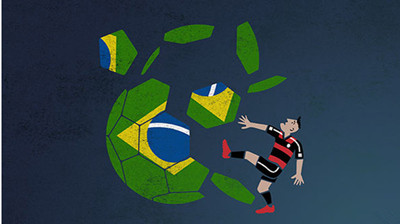貝優
Lessons of a footballing Armageddon
足球大決戰的教訓
Brazil needs new ideas, on and off the pitch
巴西需要新的想法,無論是場內還是場外
THE only previous time that Brazil hosted the World Cup, in 1950, it famously lost the final 2-1 to Uruguay, after shipping two goals in 13 minutes late in the second half. So deflated were Brazilians that Nelson Rodrigues, a playwright and journalist, described the occasion as a “national catastrophe…our Hiroshima”.
1950年,巴西第一次也是此前唯一一次舉辦世界杯,經歷了非常著名的一次失敗,2:1輸給了烏拉圭,比賽下半場烏拉圭在13分鐘內進球2個。灰心的巴西劇作家兼記者Nelson Rodrigues把這次失敗形容為“國家災難。。。我們的廣島”。
If that is the benchmark, then the 7-1 semi-final thrashing on July 8th at the hands of Germany in Belo Horizonte's Mineir?o stadium was Brazil's Armageddon. It was not just the scale of defeat—the worst since 1920. It was also the manner in which Germany's fast and technically superior players cut through the home defence, as easily as a machete through cassava. To rub salt in a gaping wound, it is Argentina—Brazil's arch-rivals—who will face Germany in the final on July 13th.
如果以那次失敗作為標準,那么7月8號在貝洛奧里藏特體育場舉辦的對德國的半決賽,7:1的比分無疑是巴西世界末日。它不僅是自1920年以來在比分上最大的一次慘敗,更體現在風格上,德國速度技術俱佳的球員穿過巴西的主防線輕松地亦如用大刀割木薯。巴西的主要競爭對手阿根廷將在7月13號的決賽上面對德國,這無疑是傷口上撒鹽。

This humiliation has left Brazilians shell-shocked. No other country in the world has a closer identification with football, as Rodrigues's hyperbole highlights. That may partly be because Brazil has no real Hiroshimas to fear: apart from brief engagement on the Allied side in Italy in 1944-45, it has not fought a war since the 1860s (against Paraguay). Through good fortune and tolerance, it faces neither military threats, nor terrorism, nor ethnic or religious tensions.
這次羞辱讓巴西人身心俱疲。正如羅德里格斯強調的一樣,世界上沒有一個國家對足球這么近的認同感。部分原因可能是因為巴西沒有像廣島那樣真的恐懼感:除了1944—1945年簡單的接觸了盟軍中的意大利,自1860年代以來就沒有戰爭(對癥烏拉圭)。得益于好運和容忍,巴西既不需要面臨戰爭威脅,也不需要面對恐怖主義,更不用說宗教和種族的緊張局勢。
But this identification with football is also because the sport has provided a national narrative and a social glue. In a country that for long periods has failed to live up to its potential, prowess at the game provided “a confidence in ourselves that no other institution has given Brazil to the same extent”, as Roberto DaMatta, an anthropologist, wrote in the 1980s. Brazil has won five World Cups but no Brazilian has won a Nobel prize.
但是對足球的這種認同感也是因為這個運動為國家和社會提供了一種凝聚力。人類學家Roberto DaMatta在19世紀80年代寫到,在一個長時期未能發揮其潛力和威力的國家,從足球游戲中得到了一種自信,這種自信的程度是其他任何機構都不可能給予的。巴西曾經5次獲得世界杯冠軍但沒有一個巴西人獲得過諾貝爾獎。
In winning the right to host this year's World Cup (and the Olympics in Rio de Janeiro in 2016) Luiz Inacio Lula da Silva, Brazil's then president, wanted to highlight that the country now has other reasons for confidence beyond football. The tournament would showcase the planet's seventh-largest economy, a vibrant democracy and remarkable social progress that has seen poverty and income inequality fall steadily in this century.
通過成功獲得今年世界杯和2016年里約熱內盧奧運會的舉辦權,巴西前任總統路易斯?伊納西奧?盧拉?達席爾瓦試圖強調現在的巴西在足球之外有其他的理由值得自信。世界杯將展示這個星球的第七大經濟體,一個充滿活力且有顯著進步的民主社會,一個在本世紀貧窮和收入不平等穩步下降的社會。
But the tournament has taken place just as Brazilians are feeling less confident about their country's course. The economy has slowed to a crawl; inflation is at 6.5%, despite a succession of interest-rate rises. The 11 billion of publicly financed spending on stadiums helped to trigger huge protests last year over poor public services, corruption and the misplaced priorities of politicians. The last-minute rush to complete the stadiums, and the tragic collapse of a newly-built flyover in Belo Horizonte this month, have highlighted Brazil's difficulties with infrastructure projects.
但是本次世界杯恰逢巴西人對于國家進程感到信心不足的時候舉辦。經濟滯緩,盡管一連串利率上浮通貨膨脹仍達到6.5%。耗資110億美元公共支出用于場館建設推波助瀾了去年針對糟糕的公共服務、腐敗、和不知輕重緩急的政治家的大型抗議活動。最后時刻才匆忙完成場館建設,本月貝洛哈里桑塔新建的立交橋發生悲劇性的坍塌,凸顯了巴西基礎設施項目的困難。
Contrary to some forecasts, the event itself has gone smoothly, without transport breakdowns or significant protests. Predictably, most fans have had a great time. Polls showed that Brazilians were warming to the idea of hosting the tournament. Despite being booed at the opening ceremony, Dilma Rousseff, Lula's successor and protégée, had felt emboldened to announce that she would attend the final.
和一些預測相反,比賽順利進行,沒有發生交通崩潰和大型的抗議活動。可以預見的是,大部分球迷有了一個歡樂的時光。民調顯示巴西人對于舉辦世界杯的想法正在變得緩和。盡管在開幕式的時候被喝倒彩,盧拉的繼任者迪爾瑪·羅塞夫大膽宣布她將出席決賽。
Brazil's shattering defeat has robbed Ms Rousseff of any hope she might have nurtured that the World Cup would provide her with a boost in an election in October at which she will seek a second term. But in itself it will not help the opposition either. Things are not as simple as that. Brazilians were always going to have other matters on their mind when they vote in three months' time. The incumbent president won in 1998 when Brazil lost badly in the World Cup final, after all; and his chosen successor lost in 2002 when Brazil won.
巴西的慘敗剝奪了羅塞夫試圖通過世界杯幫助她在11月的總統連任競選上獲得人氣提升的任何希望。但是它本身也不會有利于反對派。事情并不那么簡單。巴西人在三個月的投票期總是會有其他事情干擾他們的想法。畢竟,現任總統在1998年贏得了選舉,那時巴西在世界杯決賽中輸的很慘。但是在2002年他的繼任者輸掉了選舉,那時巴西拿到了大力神杯。
At a deeper level, however, the humiliation of the Mineir?o is likely to reinforce the country's negative mood. And that is potentially dangerous for Ms Rousseff. Though polls still make her the favourite, the campaign will only now start in earnest. Her approval rating hovers barely above 40%, and polls consistently show between 60% and 70% of Brazilians wanting change. With her centre-left Workers' Party having been in power for 12 years, can she offer it? Her appeal is in essence to past achievements—to a huge rise in employment and real wages, both of which are only just starting to move into reverse.
但是,在更深的層面,米內羅體育場的羞辱很有可能加強國家的負面情緒。這對羅塞夫來說是潛在的危險。盡管民調顯示她仍然是最受歡迎的,但是戰役現在才開始真正打響。她的支持率勉強在40%以上徘徊,民調持續顯示60%到70%的巴西人希望改變。左翼工人黨已經執政12年,她還能續寫它嗎?她的最大競爭力本質上是過往取得的成功—就業和實際工資水平的大幅提升,而這兩項恰巧開始反轉。
Similarly, the Mineir?o disaster showed that Brazilian football is no longer a source of national confidence. It too needs changes that go far beyond building shiny new stadiums. Its officials are corrupt and its domestic league poorly run. Living on past glory, it is inward-looking and tactically outdated. Brazilians may end up concluding that they need new management and new ideas, both on and off the pitch.
同樣,米內羅災難顯示巴西足球不再是國家信心的來源。巴西足球太需要改變,這種改變遠遠超出建造嶄新的體育場。官員腐敗,國內聯賽經營不善,活在過去的榮光中,短視于國內,戰術早已過時。巴西人最后可能會總結出,他們需要新的管理和新的思路,不論是在球場內還是球場外。譯者:王意












